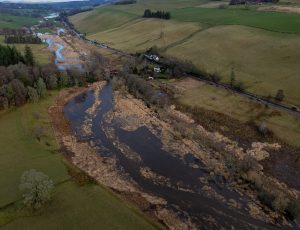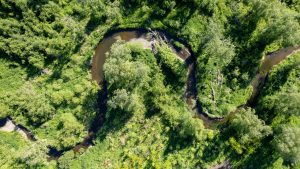2023 Awards Winner’s Spotlight: Best Practice Large-Scale Nature Conservation
Eddleston Water Restoration
Tweed Forum and Partners
This was also awarded the Tony Bradshaw Best Practice Award
This award was sponsored by:
The Eddleston Water restoration project is an outstanding example of a long-running, multi-partner initiative using nature-based solutions (NbS) to deliver ecological restoration at a landscape scale. The project started in 2010, and uses NbS to enhance biodiversity across the whole catchment, alongside reducing flood risk to local communities; focussing on enhancing ecosystem functioning and service delivery, whilst also maintaining sustainable livelihoods of local farms.
The Tweed Forum works in partnership with the local community, key agencies and NGOs. This includes scoping possible NbS options and locations; ‘negotiating’ agreements with potential landowners; identifying risks; sourcing and managing funding; delivering physical measures on-the-ground; community engagement; coordinating research and delivery; and demonstrating success and value for money. The Eddleston catchment suffered land use intensification over centuries, leading to loss of natural habitats and species. This includes straightening the river (losing 16% length), embankment and channelisation, agricultural drainage, woodland clearance, habitat fragmentation, loss of wetlands and nutrient enrichment.
Working across the 69km2 catchment on over 20 farms, the project has:
- Planted 207ha of riparian and headwater woodland (>330,000 native trees) increasing biodiversity and slowing overland flow. Riparian tree planting also enables development of
‘thermal refugia’ for salmon and other wildlife – shading from bankside trees provides climate change adaptation. - Created 36 new ponds and wetlands in the headwaters and 2 large floodplain ponds. Environmental-DNA analyses show ponds provide additional new habitats for aquatic invertebrates from over 50 families (including 25 high scoring water-quality indicator species of mayfly, stonefly and caddisfly), in addition to enhancing drought resilience and providing temporary flood storage.
- Re-meandered 3.5 km of oncestraightened, embanked river – reconnecting it with the floodplain; adding in-stream diversity; enhancing habitats for aquatic biodiversity; creating deep-water temperature refugia; and increasing channel length. Different re-meandered sections have added 8-46 % length of new river habitat. The numbers of salmon and trout have increased in line with increase in channel length.
- Placed 136 high-flow log structures in tributary streams – low-tech solutions creating in-stream diversity and encouraging out-of-bank flow. Studies have shown that nature-based measures at the landscape scale help reduce the impact of climate change-derived flood events – woody debris dams, ponds and tree planting in headwaters delay flood peaks by 3-7 hours, and reduce flood peaks by c.30%;
- Undertaken weir removal and enhancing passage for salmon, lampreys, eels.
- Discovered and taken action to conserve native Black poplar.

There is a comprehensive project website and ongoing publications, sharing learning with others and numerous visits and study-tours have been hosted. Eddleston is used as a case study nationally/internationally, including IUCN, WWF, British Ecological Society, UNESCO, World Bank, US Army Corps of Engineers, Environment Agency, SEPA and CIRIA. NbS entail introducing changes in land use/land management, codesigned to improve biodiversity and integral to ecosystem functioning.
The project enhances hydroecological connectivity at the catchment scale, promoting biodiversity and natural flood management alongside delivering for climate change, water quality and other regulatory ecosystem services. It also delivers on cultural services (recreation, education, access, tourism, landscapes).
Stakeholder engagement is key throughout, led by Tweed Forum’s own staff. Choice of type and location of NbS measures is negotiated with farmers so as to enable them to sustain their farming operations whilst enhancing biodiversity and delivery of other ecosystem services. Both landowners and the local community are involved through a detailed programme of two-way engagement, including community events, leaflets, site visits, school talks and press promotion.
Cost-benefit analysis shows NbS to be highly effective and great value for money. Using best practice and detailed data, it was calculated the NbS measures already in place deliver £4.4million NPV (net present value) from biodiversity, carbon management, water quality, recreation and other benefits, in addition to delivering £950k NPV from flood damages avoided to communities downstream. Importantly, these benefits are recognised by the local community and are increasing. To date, total project costs are £2.8 million.
We will be posting further information on each of the 2023 Awards Winners over on our blog.
